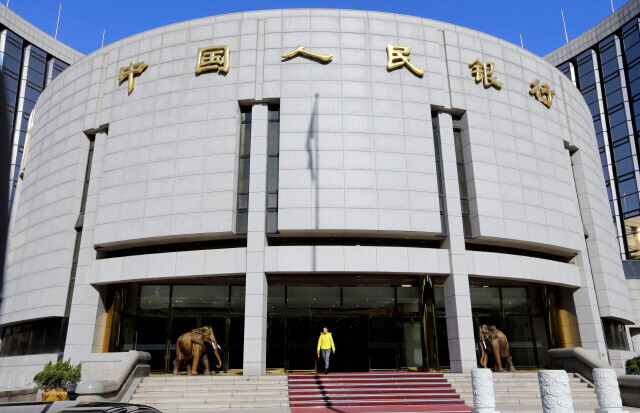hankyoreh
Links to other country sites 다른 나라 사이트 링크
China's easy money policies to have positive effect on S. Korean economy

China's easy money policies have the effect of increasing South Korean exports and lowering interest rates, an analysis shows.
Cho Yu-jeong, an associate research fellow with the Bank of Korea Economic Research Institute, published a report Tuesday titled "The Effects of Chinese Monetary Policy Changes on the South Korean Economy."
In it, she wrote that "China's easy money policies were found to increase South Korea's Chinese exports and cause decreased interest rates, increased stock prices, and inflation."
The People's Bank of China has implemented easy money measures with the introduction of various selective liquidity provision measures as it responds to the economic slowdown caused by the COVID-19 pandemic.
To begin with, the decline in the value of the yuan amid China's easy money measures results in rising Chinese exports to advanced economies. According to the report, an accompanying increase was found in exports for South Korea, which accounts for a large 73.2 percent share of intermediate goods exports to China.
In contrast, the analysis did not find any significant effects in South Korean exports falling as the decrease in the yuan's value leads to an appreciation of the won's value. The rise in Chinese consumption and imports was also found to have a minor effect in increasing South Korean exports of final goods.
China's easing measures were found to lead to a decrease in South Korean interest rates due to inflows of investment funds. As interest rates fall, the present value of companies' future earnings increases, leading to rising stock values as investment funds from around the world flow into the South Korean stock market.
In contrast, the rise in international raw material prices as Chinese demand increases was found to cause inflation pressure as expenses mount for domestic companies.
"As the financial connections between South Korea and China intensify, so too will the effects of Chinese economic fluctuations and changing trends in investment funds on the South Korean financial market," Cho said.
By Han Gwang-deok, finance correspondent
Please direct comments or questions to [english@hani.co.kr]

Editorial・opinion
![[Editorial] Penalties for airing allegations against Korea’s first lady endanger free press [Editorial] Penalties for airing allegations against Korea’s first lady endanger free press](https://flexible.img.hani.co.kr/flexible/normal/500/300/imgdb/original/2024/0502/1817146398095106.jpg) [Editorial] Penalties for airing allegations against Korea’s first lady endanger free press
[Editorial] Penalties for airing allegations against Korea’s first lady endanger free press![[Editorial] Yoon must halt procurement of SM-3 interceptor missiles [Editorial] Yoon must halt procurement of SM-3 interceptor missiles](https://flexible.img.hani.co.kr/flexible/normal/500/300/imgdb/child/2024/0501/17145495551605_1717145495195344.jpg) [Editorial] Yoon must halt procurement of SM-3 interceptor missiles
[Editorial] Yoon must halt procurement of SM-3 interceptor missiles- [Guest essay] Maybe Korea’s rapid population decline is an opportunity, not a crisis
- [Column] Can Yoon steer diplomacy with Russia, China back on track?
- [Column] Season 2 of special prosecutor probe may be coming to Korea soon
- [Column] Park Geun-hye déjà vu in Yoon Suk-yeol
- [Editorial] New weight of N. Korea’s nuclear threats makes dialogue all the more urgent
- [Guest essay] The real reason Korea’s new right wants to dub Rhee a founding father
- [Column] ‘Choson’: Is it time we start referring to N. Korea in its own terms?
- [Editorial] Japan’s rewriting of history with Korea has gone too far
Most viewed articles
- 160% of young Koreans see no need to have kids after marriage
- 2[Editorial] Penalties for airing allegations against Korea’s first lady endanger free press
- 3Months and months of overdue wages are pushing migrant workers in Korea into debt
- 4Bills for Itaewon crush inquiry, special counsel probe into Marine’s death pass National Assembly
- 5[Reporter’s notebook] In Min’s world, she’s the artist — and NewJeans is her art
- 6[Guest essay] Maybe Korea’s rapid population decline is an opportunity, not a crisis
- 71 in 3 S. Korean security experts support nuclear armament, CSIS finds
- 8S. Korea discusses participation in defense development with AUKUS alliance
- 9Cracks found in containment building of UAE nuclear power plant built by S. Korean companies
- 10At heart of West’s handwringing over Chinese ‘overcapacity,’ a battle to lead key future industries